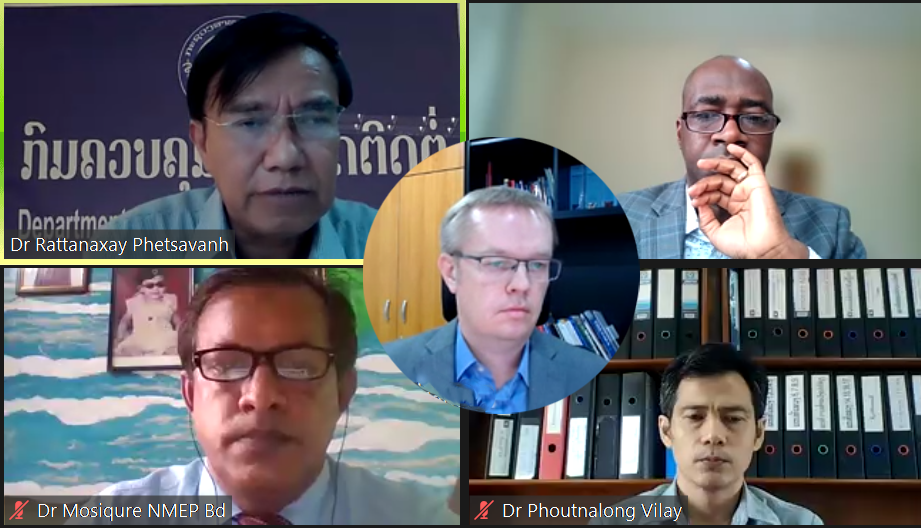
A strong surveillance system for monitoring malaria trends and detect outbreaks is vital for ensuring national malaria programmes can rapidly and effectively respond. Quality data is required to guide programme planning, resource management, and monitor programme functionality. Good data quality not only improves targeted responses, but also allows programmes to better leverage funding.
In recognition of the importance of data quality for supporting the regional elimination goal of 2030, the APMEN Surveillance and Response Working Group (SRWG) hosted a TechTalks webinar on Data Quality for Elimination on the 29th April, 2022.
The webinar was opened by Dr. Rattanaxay Phetsouvanh, Director General at the Department of Communicable Disease Control, Lao PDR and Chair of the SRWG, and moderated by Prof Richard J Maude, Head of the Epidemiology Department at the Mahidol-Oxford Tropical Medicine Research Unit (MORU) and Co-Chair of the SRWG. A brief overview of the webinar is summarized below.
Malaria Routine Data Quality Assessment Tool (MEASURE Evaluation)
Dr Yazoumé Yé, Vice President, Malaria Surveillance and Research, ICF, and Technical Director, PMI Measure Malaria Project (PMM), provided an overview of the Malaria Routine Data Quality Assessment Tool, a checklist developed to assess the quality of malaria programme data in high burden countries.
- The tool covers 37 indicators collected at the health facility level and is currently implemented during supervisory visits, whereby findings are manually entered into Excel sheets and uploaded online to produce a dashboard.
- The tool is currently not connected to DHIS2, but a mobile application is being developed to integrate data collected into DHIS2 directly and streamline use of the tool at all health administration levels.
Best Practices on Surveillance Data Quality from Lao PDR and Bangladesh
Dr Phoutnalong Vilay, Head of Epidemiology Section, Centre for Malariology, Parasitology and Entomology (CMPE), Ministry of Health, Lao PDR, shared two initiatives and partnerships that support surveillance in the elimination phase:
- The provision of refresher trainings in case investigation, response, and in Health Management Information Systems (HMIS) to build capacity for health staff and village health workers on the frontline,
- The decentralization of supervision with a data verification network that cleans and verifies data from hospitals and public private mixes (PPM) at the provincial and district levels on a quarterly basis.
Dr Vilay highlighted, political commitment, leadership, and international partnerships were also leveraged to develop surveillance data systems, guidelines, and to fund ongoing training for staff.
Dr Md Mosiqure Rahaman, Epidemiologist, National Malaria Elimination Program (NMEP), Ministry of Health and Family Welfare, Bangladesh shared the NMEP's unique data management system which included data collected by government health assistants (Excel-based Malaria Information System - MIS being integrated with DHIS2), NGO health workers (real-time data on Kobo toolbox), and the private sector.
- NMEP’s programme monitoring and evaluation plan tracks clearly defined indicators from the input to output process as part of the national malaria elimination strategy. This allows the NMEP to conduct routine surveillance data quality assessments ranging from logic cross checks of MIS data in Excel, to supervision through a checklist and on-site verifications of service provision.
- Built-in checks in the malaria module of DHIS2 also exist, as well as other processes that support and inform data quality assessment such as monthly meetings at district level and below plus quarterly/annual meetings at the central level to share feedback on data quality and make recommendations.
- Internal and external (consultant) monitoring missions are conducted every 3-4 years. Currently, the surveillance system is moving towards integrating the three data platforms onto a digital geospatial dashboard called the Malaria API tracker, currently being developed with support from MORU. The interactive dashboard can display graphs and geospatial maps which can be used at the management level to view progress and design targeted interventions.
“As we move towards elimination, ensuring that our surveillance system is capable of capturing individual cases in a timely manner will be absolutely vital to detecting outbreaks, targeting responses, and preventing re-establishment in low to zero transmission settings. This will require addressing data quality challenges at various stages from central down to the grass root level, from data collection in the field to data management processes at all health administration levels.” - Dr. Rattanaxay Phetsouvanh
The webinar was attended by over 150 participants from across the world as part of the SRWG’s aim to maintain and improve country programmes’ capacity in effectively working towards their respective elimination goals. To view the full recording of the webinar please follow this link.
